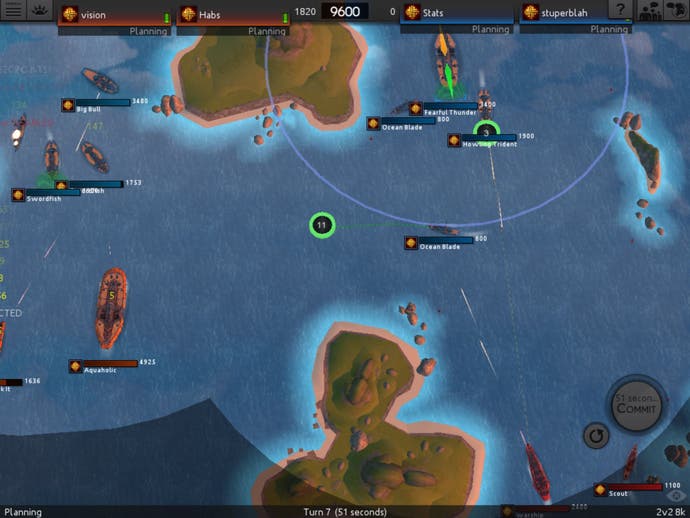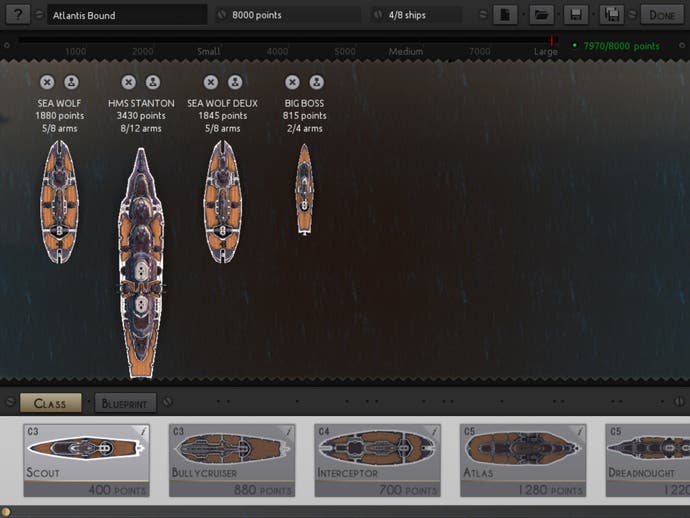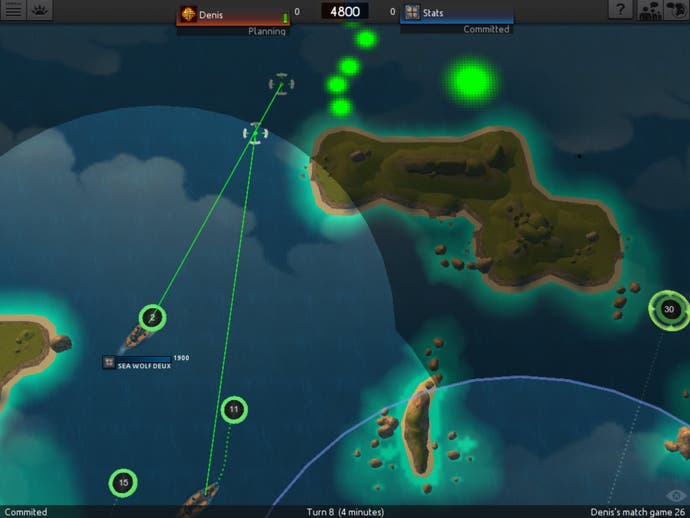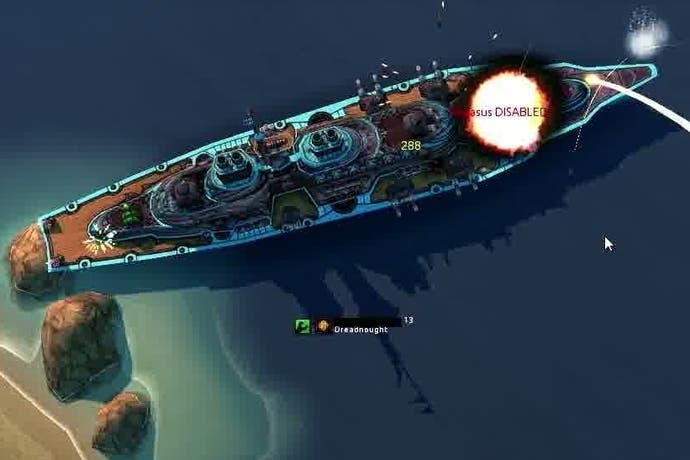Leviathan: Warships review
Wet behind the ears.
The movements of a boat can never be entirely controlled. They are vehicles at the mercy of a greater master, one whose merest breath or motion invites peril. The waves have their own rules, and Leviathan: Warships' first lesson is simple: from a standing start, boats take bloody ages to hit a decent speed.
I didn't even mention getting them at the desired angle in the water. The slow pace of movement is probably the most important thing that needs to click before you can enjoy Leviathan's chilled-out take on turn-based battling. Thankfully, the game explains the basics of manoeuvring, though it then decides it's done enough and leaves the player to figure out everything else. Leviathan is a punchy enough package to invite curiosity, though, with campaign plus multiplayer plus fleet customisation - all of which tie into cross-platform play and cloud saves across PC, Mac, Android and iOS.
With that said, this is not a game for fancy Dans. Leviathan's visuals are little better than functional, and this is exacerbated by the lack of settings and (especially) anti-aliasing; at times, your fleet's just a jaggy mess. The explosion effects aren't any great shakes either. But what Leviathan lacks in grunt it just about smooths over with smart interface design. The radial menu around individual ships is a lovely tool, as are the drag-and-drop targeting reticles for each weapon.

But - and this is a big one - such things mean nothing if the player's commands sometimes fail to register. On both PC and iPad, Leviathan has moments when clicks and taps suddenly do nothing and you have to fiddle around, deselecting the unit then going back. It never quite ruined things for me, although it tried, and in one online game it just stopped working altogether.
When things work like they should, Leviathan's controls make moving your ships a breeze (sorry), though that doesn't mean you're ready to command the waves. Boats follow instructions exactly, meaning that if you set them on a collision course or heading towards shallow waters (where larger ships can become grounded), that's what will happen. This isn't an issue when things are calm, of course, but in the heat of battle it's all too easy to start an unwitting pile-up.
The campaign is a toughie, though with only nine levels it's mainly a training ground for the wilds of multiplayer. The difficulty sky-rockets after the first few skirmishes, and you're forced to start using much smarter tactics in order to take out vastly superior forces. The shine comes off this when you realise that the enemy has fixed spawning positions, irrespective of your positioning. So after you've triggered something in the level, a nasty ship may well materialise right next to you. I checked and no, it doesn't have a cloaking field on board.

This is a major disappointment and something that instantly made my feelings towards the campaign much more lukewarm. There are still important principles to learn however, the main ones being vision and positioning. Most big ships have weapons that can hit further than they can see, and so scouts are their perfect companion, and of course about as sturdy as wet paper.
Such things become not just tactics for multiplayer, but the basis of your whole strategy - matches can be had between small, medium and large fleets and setting up custom loadouts is so easy it seems rude not to. You select the base types of ship, then drag and drop the armaments you want (within certain limits - a rocket launcher's too big for a scout boat) before the overall cost is totted up. My medium fleet consists of five cloaked scouts and a massive Atlas battlecruiser armed to the teeth; find the enemy, position the big boy, and let them chase the scouts into the mouth of hell.
Multiplayer is where you start to notice how the little details matter, like having all your guns on one side of a boat. You'll almost never turn them around once battle's begun, so why have all that money going to waste when you could have double the firepower on the enemy-facing side? And this is where Leviathan's neat blending of real-time elements into turn-based play really takes off. Each turn takes 10 seconds to play out, and depending on their cooldowns, weapons, shields and other equipment may activate during the turn as opposed to at the start of it. There's nothing quite like seeing an enemy launch a salvo at your incoming forces, your shields popping up just in time to absorb every shot.

There's a lot of this, and an element of luck to how effective any given attack is. Shots can be absorbed by shields, or if they're not powerful enough may just deflect off the target. Others might disable critical enemy weapon systems, even the engine, or in the best case scenario cause sinking. Ships auto-repair damaged systems over time but can't restore health, meaning that losing a gun to a lucky shot is no terrible news - as long as you're not taking artillery fire at the same time. It's this twist of fate that can turn games, and gives a subtle combat system the feeling of something much more dynamic.
There had to be one last caveat though, and it's a killer. Leviathan: Warships is sold in bits, and it is a top-down business model. This is not about in-app purchases or day-one DLC as a principle, but about their implementation in an otherwise traditionally structured game. It feels like Leviathan: Warships has been carved up in order to disguise its true price - and this is only the beginning. To play the game across multiple platforms requires it to be bought separately for each one. Not only this, but the expansions have to be bought on each device too. Developer and publisher will find someone else to blame for this, as there always is, but it makes Leviathan's big cross-platform promise a hollow and expensive one.
This is unfortunate, because the game underneath is good fun, and on tablets doesn't have a huge amount of quality competition. On PC, this is a much tougher sell, but even then I could see my way to giving it the odd hour or two. What scuppers Leviathan is nothing more than a slightly slapdash release - and greed. The bugs in the controls will probably be fixed soon enough. But as for the 'extra content', sadly it's here to stay.









